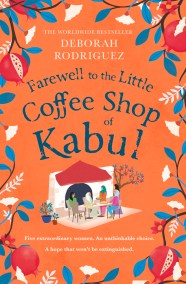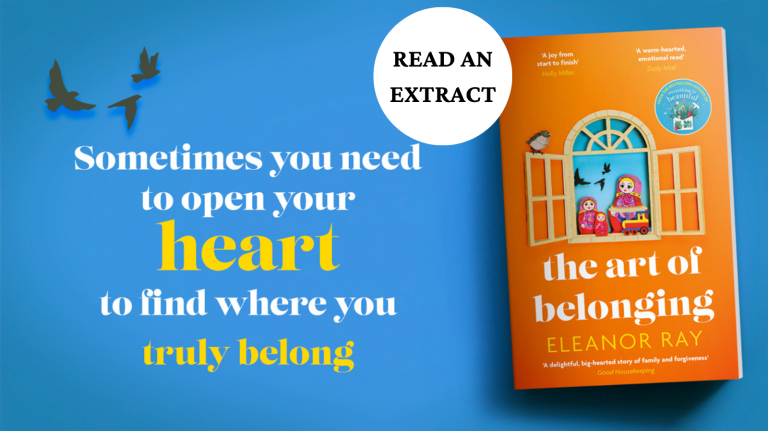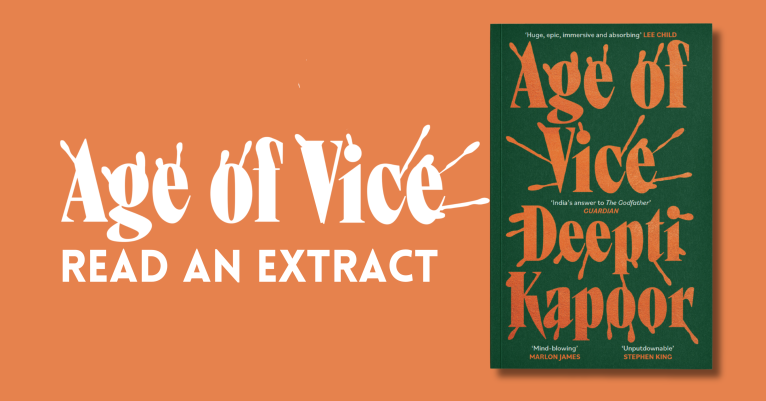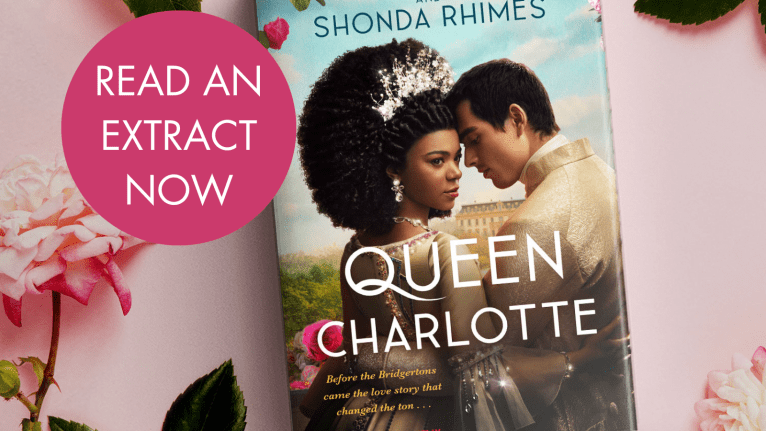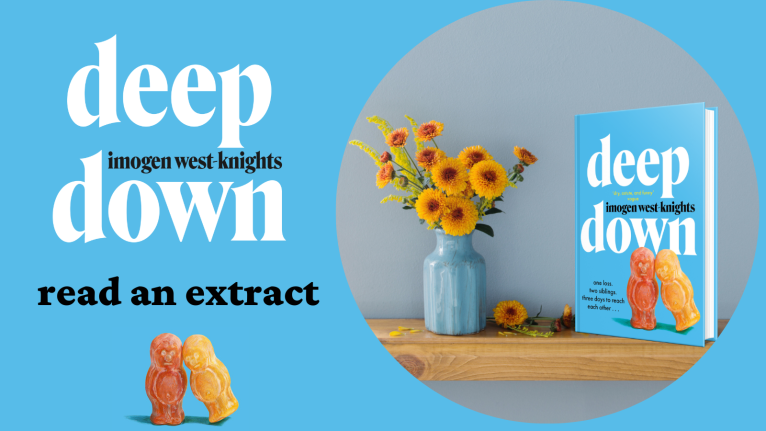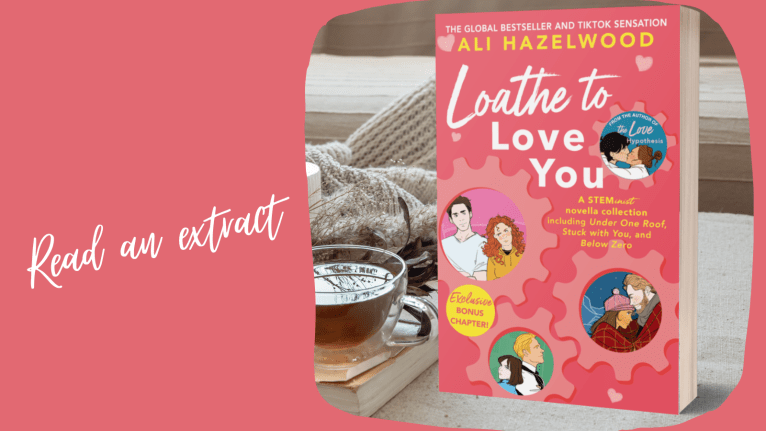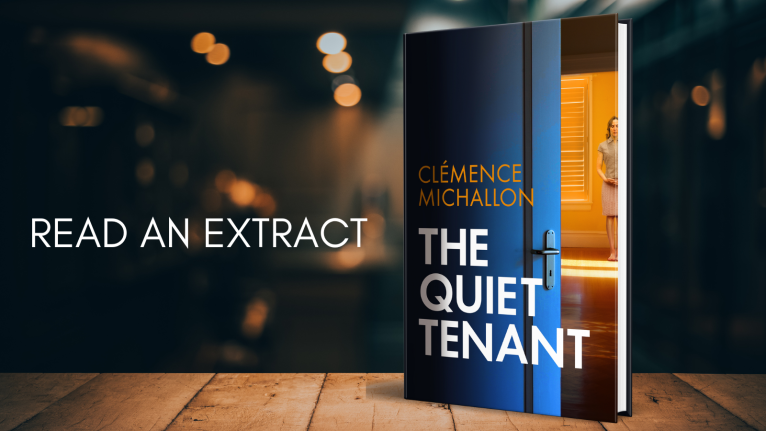Read an Extract from Farewell to The Little Coffee Shop of Kabul by Deborah Rodriguez
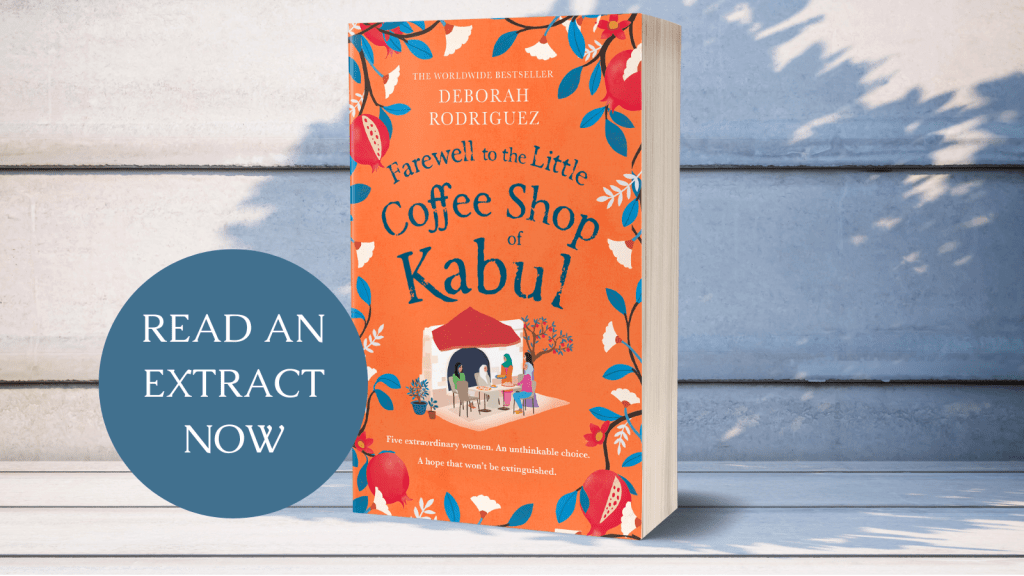
I
Monday, July 26, 2021
Sunny sat wedged between Halajan and the back door of the old Mercedes convertible, the large pink elephant slumped on her lap as if it were a petulant child. There had barely been room for her luggage, what with the entire family insisting on coming along to greet her at the airport, showering her with
flowers and balloons and kisses and more than a few tears. Fitting everyone in the car to go home was like trying to put toothpaste back into the tube. Despite the dust clogging the skies, they’d had to open the top to accommodate everything she’d brought—most of it gifts, including the stuffed animal for little Aarezo that was now blocking Sunny’s view of the city.
After twenty-nine hours in the air, from Seattle to London to Doha to Kabul, the jetlag was taking its toll. Things felt a little surreal. Landing once again in Afghanistan, being with her friends, not having Jack by her side—it seemed weird and familiar, happy and sad, all at the same time.
The hot summer air felt like a blow dryer set on high, aimed smack at Sunny’s face. She could feel the moisture being sucked right out of her skin. The balloons were batted around by the breeze, making her feel as though they were aboard a float in some sort of bizarre parade. Halajan was downright giddy, holding Sunny’s hand in a tight squeeze, jabbering away like a magpie. They had barely left the parking area when she’d launched into a rambling story about how she’d outsmarted an unscrupulous vendor at the Mondai-e, the city’s largest market, by pretending to be the mother of the chief of police. “And do you think that man’s prices suddenly turned to half of what they were? You bet your ass!” she cackled. The old woman seemed to have barely aged in the eight years since they’d last seen each other. They’d video chatted regularly, but in person, somehow, Halajan seemed more vibrant. Sunny was relieved.
Halajan’s husband, Rashif, was seated on the other side of his wife with eight-year-old Aarezo on his lap. What little hair was left on Rashif’s head had gone completely gray. He looked distinguished, grandfatherly. In the front seat Halajan’s son, Ahmet, was behind the wheel sitting straight and proud. Sunny couldn’t help but think of the tortured young man Ahmet had been when they first met, struggling so hard with his tradition-alist views in a changing world. Since then he had become such a loving husband and father, a man dedicated to standing up for what’s right, committed to supporting his wife, Yazmina, in her efforts to help those who couldn’t help themselves. There she sat, right by his side, that naive girl from the mountains, who had landed on the Kabul Coffee Shop doorstep scared and alone so many years ago. But that girl was long gone, and in her place was a woman bursting with confidence, which was only right considering how much she had accomplished. Next to Yazmina was her younger sister, Layla, balancing her twelve year-old niece Najama on her lap.
Sunny wrestled with the head scarf that kept slipping off her in the gritty wind. How the Afghan women always wore the chador so effortlessly remained a mystery to her. Halajan reached in to help, looping the cloth into place in one quick move.
“Hey, Hala, why aren’t you the one driving?” Sunny asked. Halajan had taken great pride in secretly learning how to drive
not long before Sunny’s last visit.
“He says I’m too old to drive.” She pointed her chin toward Ahmet as she spoke. “Ach!”
Sunny peered around the elephant’s ear as they passed some of the new, massive wedding halls that had gone up in recent years.
Las Vegas was what the road had come to be called, due to the mirrored glass and bright neon lights that far outshone the starry Afghan night skies. The traffic was still heavy, the smell of diesel and the blaring of horns as familiar as her face in the mirror.
It wasn’t long before they found themselves in gridlock, stranded in the open car like sitting ducks for the constant flow of beggars and peddlers desperate for a little cash. A small hand thrust a rusty tin can billowing with smoke into Sunny’s face.
Espand bala band! the little boy pleaded. A spandi, one of those many children spending hours a day working to bring home a few afghanis to help feed their mothers and siblings by trying to sell the burning herb thought to ward off evil spirits. The boy eyed the balloons with envy, and Sunny’s heart broke. “Give him some coins, would you please, Yaz? I haven’t changed any money yet.”
They finally inched forward, but again had to slow to a stop as they approached the police checkpoint near the American embassy, to wait their turn for inspection by the K-9 unit. Sunny felt herself stiffen. The mere sight of dogs sniffing around the tires and the swarm of men in full uniform and bulletproof vests, wielding rifles almost as big as they were—weapons they seemed to be itching to put to use—was enough of a reminder of just how dangerous a place Kabul could be. Horns honked. Tempers were on edge. Sunny watched as a pair of police wove through the chaos, sweeping mirrors on long poles under the cars’ chassis to check for explosives.
The Mercedes was almost through the mess when there was a commotion up ahead. A battered red Toyota had tried to back up. Guns were drawn. A man and a woman were dragged from the car. There was shouting, lots of confusion. The man yelled back then was suddenly on the ground. The woman looked frightened. Sunny held her breath. She knew how unpredictable the police could be. Suddenly a loud pop sent her diving toward the floor of the car with the pink elephant clutched tightly around her head. And then, silence.
“Did you drop something down there, Sunny jan?” Hala howled after a beat.
Sunny sat up to see her old friend laughing, a lifeless piece of blue rubber tied to a string dangling from her knobby fingers. The Toyota was waved through and Ahmet pulled forward.
Sunny settled back into her seat, embarrassed. It had been so long since she’d lived in a warzone that she’d forgotten how normalized situations like this could become for people; when you live every day among chaos and destruction, you barely notice it. Even Sunny had found herself somewhat inured after a couple of years of living in Kabul, but she never became quite as accustomed to the havoc as the Afghans did. She remembered the day she heard a blast not far from the coffeehouse, strong enough to make the cups rattle on their shelves. By the time she went past the spot where the explosion had occurred, not more than an hour later, the shopkeepers were already sweeping up the broken glass from the blood-stained street, carrying on with business as usual.
They were now approaching Massoud Circle, where a new high-rise had sprouted from the ground. Mohib Towers.
Rashif raised his voice to be heard over the noise. “Stores, apartments, offices. It is impressive, is it not?”
It was. Kabul had changed. It struck Sunny that she was seeing less of the big-ass SUVs that used to hog the roads ferrying UN workers and NGOs around the city. It seemed as though the last of the foreigners had already left. Either that, or those who remained were locked in their compounds waiting for the clock to tick down. But what she did see were lots of women. Afghan women, walking in groups or even alone, carrying books or briefcases with their heads held high, their eyes ready to meet those of anyone who might try to challenge them. “So many women out and about. It’s nice to see.”
“I have heard there is even a woman who became a mayor out in the Wardak province when she was just twenty-four years old,” Ahmet spoke over his shoulder toward Sunny. “She was one of the first. There are a few.”
“Back in the old days, when your mother was a girl,” Layla explained to Najama as they pulled up to a stop sign, “the only jobs women could have outside their homes were in women’s prisons and hospitals, or at checkpoints at the airport. Anywhere they would not have to mix with men. Now you see women who are lawyers and journalists and politicians. Always remember, you can be anything you want, if you work hard enough.”
An awkward silence filled the car, the growing uncertainty surrounding Layla’s declaration remaining unspoken. Sunny rushed to change the subject as they finally pulled forward.
“Will you look at that,” she said, craning her neck to see. They were driving adjacent to one of the concrete barricades that ringed the city. Staring back at Sunny was a pair of giant eyes that had been painted by someone with obvious skill.
“It’s a message of anti-corruption. The words are Man Tora Mebinm, which means ‘I see you,’” Ahmet explained. “There are graffiti artists who have done things like this all over Kabul. They call themselves ArtLords.”
“Ha! ArtLords. I love it.”
“Sometimes the murals have messages about women’s rights or anti-terrorism, things like that,” Ahmet continued.
“There is a really good one that shows streetsweepers,” Rashif added. “It is meant to celebrate the everyday people who are heroes, instead of those with guns or swords.”
“That’s fantastic.” Sunny swiped at the dust that had settled on her face with her free hand. She couldn’t help but think of the blast wall she’d worked so hard to cover with paint over a dozen years earlier, back when the Kabul Coffee Shop was hers. It stood thirteen feet tall against the street, a monstrosity required to get the compliance that would allow UN personnel to frequent the café. After many fits and starts she’d finally
settled on a scene that had been etched in her brain ever since a life-changing visit to Mazar-e Sharif—thousands of white doves soaring across a clear, cobalt sky. It was just after that trip when she’d realized she was truly in love with Jack.
They wound their way through the tangle of cars and motorbikes in Shahr-e Naw, downtown Kabul, past tall shiny buildings that housed offices, hotels and banks. There seemed to be many more beauty salons and supermarkets than before.
“Oh my God, what is that?” she asked as they slowed near an odd vehicle that looked like a hot dog on wheels.
“It’s a food truck. Hot dogs and hamburgers,” Ahmet explained.
“Oh, wow. I sure wish we’d had that when I lived here. And all these stores!” Sunny couldn’t wait to hit the shops and markets, even though she’d promised herself to return home with far less than she’d brought. What surprised her was the number of
places she recognized—Clark shoes, a Subway sandwich shop, even an Apple store on the ground level of the huge City Center Mall. “An Apple store,” she said out loud. Jack would have never believed any of this.
“It is not a real Apple store,” Yazmina explained. “It’s unofficial. A lot of those big-name stores are.”
“Fakes?” Sunny asked.
Yazmina shrugged in reply.
“You see over there, Sunny jan?” Layla pointed toward a trendy, glass-fronted café. “That is the café where I go now. You will love it. It’s where all my friends meet. We have some very interesting conversations with men, women, everyone saying what they think.”
“Really? That would never have happened when I was here.”
“And maybe it should not be happening right now,” Ahmet said.
“Laalaa, big brother, you worry too much. You yourself have always talked about the importance of discourse, the voicing of opinions. That is all we are doing there.”
“I know that. But perhaps there are others who don’t look at it that way. I just want you to be safe. You know what I always tell you—you can never trust anybody but your family.”
“I am always careful,” Layla replied. “I have eyes in the back of my head like Hala, and ears as big as that ridiculous elephant behind me.”
Najama giggled.
Sunny could not believe what a formidable young woman Layla had grown into. Well, actually, she could. When Layla had first arrived in the States as a sixteen-year-old with a one-year student visa, she had clung fiercely to her traditions. She’d stayed at Sunny’s place, on Twimbly Island off the coast of Washington, where things had started out rough. There Layla was a fish way out of water. But when the year was up, she’d returned to Kabul a changed person. Not that she’d given up an ounce of her identity—she’d simply expanded it with a mind that embraced new thoughts and a voice unafraid to question everything.
It wasn’t long before they entered the Qala-e-Fathullah district, where the old coffee shop sat. “They paved the roads!”
Everyone nodded. Jack had had a point when he’d insisted, some sixteen years ago already, that it was time to give Afghanistan back to the Afghans. The progress that had been made, against so many odds, was undeniable.
But just around the next corner Sunny was met with a harsh dose of reality that made the hair on her arms stand on end, despite the sweltering heat. Shahr-e Naw Park, with its tall, old pine trees and patchy lawn, had in her time been a place for locals to gather for games of chess and carrom, and, sadly, to buy and sell drugs—especially after dark. Back then it was mainly men who wandered the park’s walkways or stretched
out on the scrappy ground, but what Sunny saw now was what appeared to be a new population. Dozens of burqa-clad women were balancing babies on their hips and shepherding little ones around makeshift shelters strung between the trees and pop-up tents that rose from the ground like big neon mushrooms.
“What the hell is going on there?” she asked. “Who are they?”
“Refugees,” Yazmina replied softly. “From the provinces in the north—Takhar, Kunduz, Badakhshan. Many have run from homes that have been taken or burned to the ground by the Taliban. Their towns and villages have been destroyed, their men killed. Some have been sent by their husbands and fathers, who have stayed behind to protect their homes. They have nowhere to go, and their numbers are growing by the day.”
Ahmet had slowed, as if in respect for these women and their children. Once again the car grew quiet.
“Stupid Talib idiots,” Halajan muttered as they made the next turn. Here, the street was as full of pedestrians as ever, the chokidors at their posts dressed in black with their weapons slung across their puffed-out chests, as if they’d been standing guard ever since Sunny left.
And there it was. The turquoise gate, that crazy wall. The little coffee shop of Kabul. Sunny was home.
To keep reading, get your copy of Farewell to The Little Coffee Shop of Kabul now
THE LITTLE COFFEE SHOP OF KABUL CAPTURED THE HEARTS OF MILLIONS READERS WORLDWIDE. NOW, THE COFFEE SHOP DOORS WELCOME YOU HOME ONE LAST TIME...
Kabul, August 2021
Sunny Tedder is back in her beloved coffee shop. After eight years away, she's thrilled to reunite with her Kabul 'family':
Yazmina now runs a pair of women's shelters from the old cafe, and dreams of a bright future for her two young daughters.
Her sister Layla has become an outspoken women's rights activist and, thanks to social media, is quite the celebrity.
Kat, Sunny's friend from America, is wrapping up her year-long stay in the land of her birth, but is facing some unfinished business.
And finally there's elderly den mother Halajan, whose secret new hobby is itself an act of rebellion.
Then the US troops begin to withdraw - and the women watch in horror as the Taliban advance on the capital at ferocious speed...
Set against the terrifying fall of Kabul in 2021, Deborah Rodriguez concludes her bestselling Little Coffee Shop trilogy with a heart-stopping story of resilience, courage and, most importantly, hope.

